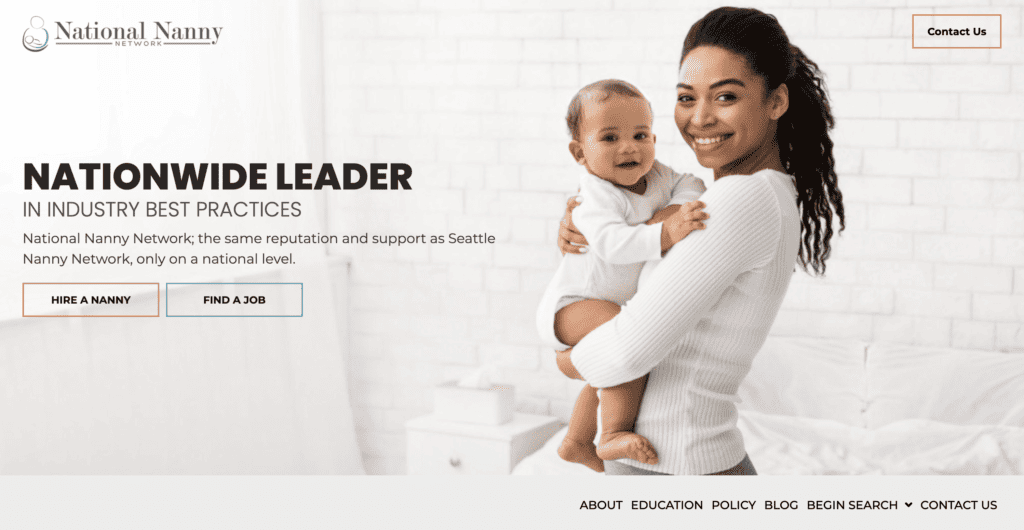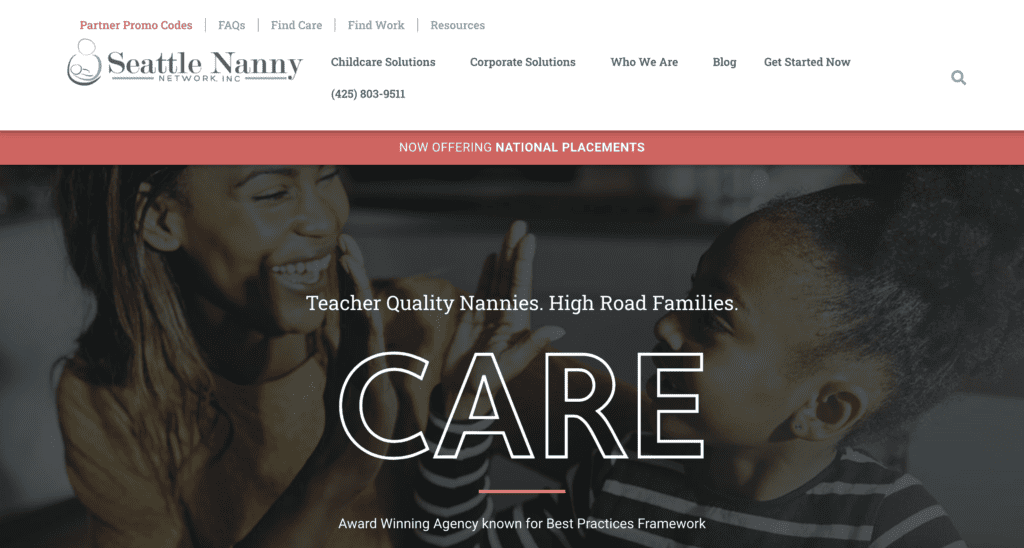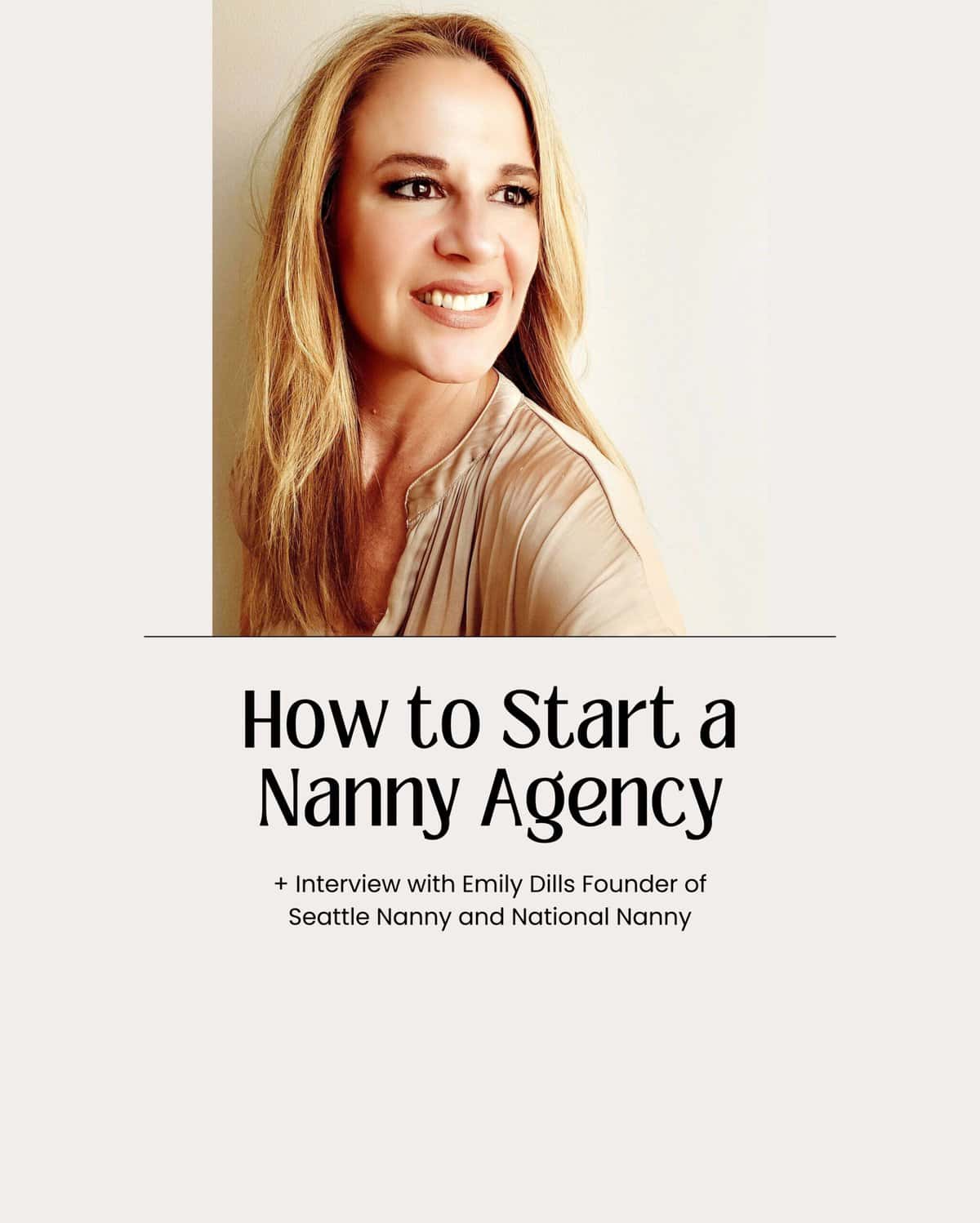This page may contain affiliate links. Please read my disclosure for more information.
If you’ve ever considered entering the rewarding world of childcare services, this step-by-step guide to starting a nanny agency will answer all your questions. With busy families and the rising demand for professional childcare and temporary or live-in nanny placements, starting a nanny agency can be a lucrative and fulfilling business opportunity.
In this guide, I’ll share my personal experiences and insights gained from launching and growing my online businesses, offering valuable tips and strategies. Later in the post, I’ll interview Emily Dills, founder of SeattleNanny.com and NationalNanny.com, to give you an inside look at a successful nanny referral agency.

Navigating the world of childcare services can be daunting, especially when you’re considering starting your own nanny agency. In a field where trust and reliability are paramount, it takes more than just a good heart to succeed. Fortunately, Emily Dills, an entrepreneur and advocate with over 27 years of experience in the industry, has paved the way with her ventures, Seattlenanny.com and Nationalnanny.com.
Seattlenanny.com, Emily’s flagship business established almost three decades ago, serves as a testament to her dedication to providing top-notch childcare solutions. With the recent launch of Nationalnanny.com in 2021, Emily has expanded her reach, catering not only to private families but also to corporate clients, including hospitals, law firms, and tech companies.
Here are the 12 crucial steps to help you build a thriving nanny agency:
1. Research and Market Analysis

In the early stages of starting your own nanny agency, laying a strong foundation through effective market research and planning is essential. By understanding your target audience and local competition, you’ll be well-prepared to provide exceptional childcare services while ensuring the growth and success of your small business itself. Let’s dive into these crucial steps to help you build a thriving nanny agency.
A. Identify Your Target Market
Parents Seeking Nanny Services
The primary audience you’ll want to cater to includes parents actively seeking nanny services. These parents are typically busy professionals or households with unique childcare needs. Understanding their preferences, schedules, and specific requirements will help you tailor your agency’s offerings to meet their expectations.
Corporate Clients
Another crucial target market for your nanny agency includes corporate clients seeking corporate childcare benefits. These clients can be businesses such as hospitals, law firms, and tech companies looking to provide childcare solutions for their employees. Understanding the unique needs and preferences of corporate clients will allow you to tailor your services to meet their requirements effectively.
Nannies Looking for Job Placements
In addition to parents, you’ll also need to focus on nannies seeking job placements. Your agency will serve as a bridge between nannies and families, so it’s essential to establish a database of skilled nannies looking for opportunities. Building a network of trusted nannies will enable you to provide a variety of options to your clients, ensuring a successful match between nannies and families.
B. Conduct Market Research
Before diving headfirst into the nanny agency business, conducting thorough market research is crucial. This involves gaining insights into the local childcare industry, understanding the demand for specific nanny services, and identifying your competition. Market research will enable you to pinpoint the unique selling points (USPs) that will set your agency apart from others in your area. It’s also essential to stay updated on current trends and emerging needs within the childcare market.
2. Create a Business Plan

A well-structured business plan is a roadmap for your nanny business. Define your business goals and objectives clearly. Consider factors like the number of families you aim to serve, revenue targets, and the level of customer satisfaction you want to achieve. Setting measurable goals will help you track your agency’s progress and make necessary adjustments.
3. Legal Requirements

A. Choose a Legal Entity
Selecting the right business structure is a crucial decision when starting your nanny agency. You have several options, including sole proprietorship, Limited Liability Company (LLC), partnership, or corporation. Each structure has its advantages and disadvantages regarding liability, protecting personal assets, taxation, and management.
Consider consulting with a legal or financial advisor to determine which structure best aligns with your agency’s goals and circumstances. Once you’ve established your business structure, you can open a business bank account.
B. Necessary Permits and Licenses
To operate your nanny agency legally, you’ll need to register it with the appropriate government authorities and pay the appropriate sales tax. This process typically involves registering your business name with the state, obtaining a federal Employer Identification Number (EIN) (also known as a sales tax number) for tax purposes, and securing any required permits or licenses specific to your locality or industry.
C. Understand Insurance Requirements
Insurance plays a vital role in protecting your nanny agency and its clients. You’ll need to consider liability insurance, which covers potential claims or accidents involving the nannies you place with families. Additionally, worker’s compensation insurance may be necessary to protect your employees or nannies. Always consult with an insurance professional to assess your specific needs and ensure that you have adequate coverage to mitigate risks.
D. Compliance with Labor Laws and Regulations
Compliance with labor laws and regulations is important in the nanny agency business. Familiarize yourself with both federal and state labor laws, especially those related to employment, wages, working conditions, and background checks. Understand the legal obligations you have toward both the nannies you place and the families you serve. Developing comprehensive employment contracts that adhere to these laws and regulations is crucial to maintaining a smooth and legally sound operation.
Navigating the legal and regulatory landscape may seem daunting, but it’s a necessary step to protect your nanny agency and build trust with clients and nannies. Seeking professional guidance and staying informed about relevant laws will ensure that your agency operates ethically and within the boundaries of the law.
4. Branding and Marketing

A. Branding – Create a memorable brand identity that reflects professionalism and trustworthiness.
B. Website – Build a professional, mobile-friendly website with SEO optimization to attract clients and nannies. If you’re looking for an easy all-in-one website builder, and marketing and sales platform, check out Go High Level.
C. Digital Marketing – Use social media, online advertising, and blogging to reach a wider audience.
D. Networking – Connect with local parenting groups and organizations for referrals and collaborations.
E. Local Advertising – Consider placing ads in local magazines and newspapers targeting parents and families.
5. Recruitment

Many small businesses, including nanny agencies, often start with just one person handling all aspects of the business. In the early stages, it’s common for the founder to wear multiple hats and manage recruitment, administrative tasks, client interactions, and more.
If you are the sole employee of your nanny agency initially, it’s essential to focus on building a strong foundation, building trust and reliability with clients, providing onboarding and training for nannies, developing efficient processes, and gradually expanding your team as your agency grows. As a new business owner, you must balance various responsibilities and prioritize tasks to ensure smooth operations and exceptional service to your clients.
As your agency gains traction and secures more clients and nannies, you can consider hiring additional staff to help with recruitment, administrative work, and other functions. This gradual expansion will allow you to maintain the quality and professionalism of your agency while managing its growth effectively.
6. Legal Documents and Contracts

Drafting clear and comprehensive contracts is essential in the nanny referral agency business. Contracts serve as the foundation for the working relationships between your referral agency license, clients, and nannies. Ensure that your contracts outline all relevant terms and conditions, including:
- Job responsibilities and expectations for nannies.
- Compensation and payment schedules.
- Duration of placements.
- Termination policies and procedures.
- Confidentiality and non-compete clauses.
- Liability and dispute resolution procedures.
By creating legally binding contracts, you provide clarity and protection for all parties involved, reducing the risk of misunderstandings or legal disputes.
If you’re uncertain about the legal intricacies of contract drafting or have specific legal concerns related to your nanny agency, consider involving legal advisors or attorneys who specialize in employment and business law. They can provide guidance, review contracts, and ensure that your agency complies with all relevant laws and regulations.
7. Client Acquisition

Client acquisition is a pivotal aspect of running a successful nanny agency. Building strong client relationships through trust and reliability is essential. Effective consultations with parents to understand their specific childcare needs lay the foundation for successful matches.
Utilizing your database of qualified nannies, you can carefully pair them with families based on unique requirements, ensuring satisfaction on both sides. Providing thorough onboarding and training for nannies helps in delivering high-quality services.
Clear expectations and contracts prevent misunderstandings, fostering positive long-term relationships with clients. Conducting background checks, including county criminal searches, adds an extra layer of assurance, demonstrating your commitment to the safety and well-being of the families you serve.
8. Operations and Administration

Efficient operations and administration are the backbone of a successful nanny agency. Setting up streamlined scheduling, billing, and record-keeping systems is paramount. Effective scheduling ensures that nannies are matched with families promptly, enhancing client satisfaction.
An efficient billing system guarantees prompt and accurate invoicing, contributing to healthy cash flow. Maintaining meticulous records, including financial transactions, contracts, and payroll, simplifies agency management, ensures compliance, and supports informed decision-making. These operational practices not only save time but also contribute to the agency’s professionalism and reputation for reliability, crucial factors in the competitive nanny referral industry.
9. Financial Management

- Pricing Strategy – Set competitive and fair prices by considering your operating costs, local market, and services offered.
- Expense Management – Monitor expenses like salaries, marketing, and office costs to maintain financial health.
- Business Credit Card – Use a business credit card to separate business and personal expenses and build credit history responsibly.
- Business Loans – Explore loans for agency growth, including hiring staff, marketing, or expanding to new locations. Research options aligned with your financial goals.
10. Safety and Training

Safety and training are non-negotiable priorities for any reputable nanny agency. Ensuring the well-being of children in your care is paramount, and rigorous safety protocols must be in place. Nannies should receive comprehensive training in childcare best practices, safety measures, and effective communication.
Regular updates on safety guidelines and ongoing professional development contribute to the agency’s commitment to excellence. By prioritizing safety and training, your agency can build trust with both clients and nannies, reassuring families that their children are in capable and caring hands, and setting a high standard for quality in the nanny referral industry.
11. Networking

Networking is a vital component of your nanny agency’s success. Effective networking not only expands your reach but also builds trust and credibility in the childcare community, ultimately benefiting your agency’s growth and success. Here’s how you can effectively expand your network:
- Local Groups –Join and engage with local parenting groups and childcare organizations to connect with parents, nannies, and industry professionals.
- Online Presence – Utilize social media and online forums to reach a broader audience and participate in relevant discussions.
- Professional Associations: Consider joining childcare and nanny agency associations for networking opportunities and industry knowledge.
- Local Partnerships – Collaborate with businesses catering to families and children for mutual promotion.
- Referral Programs – Implement referral programs to encourage clients and nannies to refer potential clients.
- Industry Events – Attend conferences and events to network with professionals and gain industry insights.
- Schools and Colleges – Connect with local educational institutions to reach parents and students seeking nanny services.
12. Growth and Scalability

To grow your nanny agency, consider expanding services or locations to reach a wider audience. Develop referral programs that encourage clients and nannies to recommend your agency to others, fostering organic growth through word-of-mouth marketing. Stay updated on industry trends and adapt your services to meet evolving client needs, positioning your agency for long-term success.
Conclusion
Starting a nanny agency offers a rewarding business opportunity in the childcare industry. By following these steps and maintaining dedication and professionalism, you can establish a successful agency that serves the needs of both families and nannies. Embark on this fulfilling journey with confidence, knowing that quality childcare services are in high demand and that your agency can make a positive impact on the lives of many. Now let’s jump into the interview!
Interview with Emily Dills From Seattle Nanny and National Nanny

1. Introduce yourself – tell us about your business and customers.
I am an entrepreneur and activist, and after nearly three decades, I still love what I do! I incorporated my business, Seattlenanny.com almost 27 years ago, and in 2021 I launched my newest venture Nationalnanny.com. I work in a niche industry, sourcing quality childcare providers for private families and for employers who offer the service as a corporate benefit. My clients have taught me everything I know. They range from busy working parents to local hospitals, law firms, and tech companies; and I am so grateful for the privilege to have worked with and learned from them. I now devote a lot of my time to advocacy and public policy development at the local, state, and federal levels. I believe that childcare is an economic issue with a ripple effect that impacts all sectors. Childcare workers tend to be overlooked and undervalued. Until we solve the problem of quality and affordable child care for all we will continue to hold working Mothers back from achieving equity and advancement in the workplace.
2. What inspired you to start your own business?
I would not have been anyone’s first choice to be a business owner. I stumbled upon it. My passion was for politics and law. However, I also loved working with children and have deep respect for those who choose to work in childcare and education. In college, I worked as a nanny and recognized that the industry was unregulated in the US. Encouragement and funding came my way so I took the leap and opened my own business. I saw an opportunity to create positive change by introducing more structure and framework to the industry. The industry looks very different from when I started my business. Decades on, I am proud to be engaged in the process of making lasting change.
3. What are the most important lessons you’ve learned as an entrepreneur?
I’ve learned to face my fears regularly. Being a business owner is very humbling. No day is the same, so don’t expect it to be. You will have good days and bad days, or even good years and bad years. Know that both the highs and lows are temporary. You will have wins and losses and every experience will teach you something. The most demanding clients and the most challenging situations I’ve ever dealt with taught me my greatest lessons, although it was gut-wrenching at the time. I have also learned how important it is to surround yourself with people who are smarter and more experienced than you are.
4. What resources, such as books, courses, or mentors, have been helpful in your personal and professional development?
I am a huge fan of Mindvalley and have been a member for many years. I listen to the lessons every morning and I attend as many live calls as I can. They are really cutting edge with personal and professional development.
I also love to read. Some of my favorite books are ones I revisit over the years. Hyrum Smith’s “10 Natural Laws of Successful Time & Life Management” and “Showing up for Life” by Bill Gates, Sr. fall into this category. More recent favorites are “Breath: the New Science of a Lost Art” by James Nestor, and “Atomic Habits” by James Clear.
I also took the Lifebook course, which is a pretty raw, existential experience. The end result is that you have created a very detailed blueprint for your best life. I highly recommend it.
5. What platform, software or tools do you use to run your business?
My company has tried or currently uses many recognizable applications and systems. The one that I’m personally most enthralled with is Canva. We have used it almost since they began, and they have recently upped their game with new AI tech and video tools. There’s not a lot you can’t do with it.
(Emily uses WordPress to write her blog.)
6. How do you maintain a work-life balance as an entrepreneur?
The other day, I read that we should treat our health and well-being like a high-value investment portfolio. This is great advice. There is no such thing as balance. Owning a business consumes you. There are times when I can completely step away, and times when I am very close to the fire. What makes the more demanding times sustainable is the habitual maintenance of well-being. I sustain myself by making a contribution, however small, to my physical health and mental wellness every single day.
7. What advice would you give aspiring entrepreneurs who are just starting their journey?
Believe in yourself and surround yourself with people who believe in you, period. It’s simple physics. If the glass is filled with positives, there’s no room for negatives. So make sure the glass is full.
Where can people find you?
Emily@seattlenanny.com or Nationalnanny.com
If you enjoyed this post you may also enjoy reading more from my Self Made Entrepreneur Series.







+ show Comments
- Hide Comments
add a comment